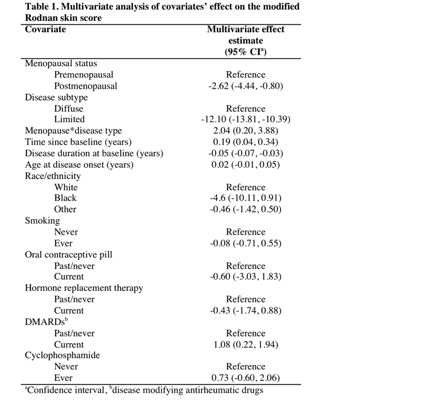Session Information
Session Type: Abstract Submissions (ACR)
Background/Purpose: Menopause, characterized by a low estrogenic state, is associated with skin thinning, due to decreased extracellular matrix protein deposition by fibroblasts. Although systemic sclerosis (SSc) most commonly occurs near the end of the reproductive period and predominantly affects women, no one has investigated the impact of menopause on skin involvement in women with SSc. Thus, we aimed to evaluate the effect of menopause on skin thickening, as measured by the modified Rodnan skin score (MRSS), in women with SSc.
Methods: We identified women with either limited or diffuse SSc, aged ³ 18 years, enrolled within the Canadian Scleroderma Research Group (CSRG) cohort, between 2004-2011. As part of the CSRG cohort, subjects undergo annual assessments with standardized questionnaires and physical examinations.
We performed multivariate regression analyses using generalized estimating equation (GEE) to determine the effect of menopause on the MRSS, adjusting for relevant covariates (Table 1).
Results: We identified 1070 women with SSc, contributing a total of 3546 observations over the study period. Of these women, at baseline, 65% had limited disease and 35% diffuse disease. At cohort entry, mean age and mean disease duration were respectively 55.5 [standard deviation (SD) 11.7] and 11.2 (SD 9.6) years, and 72% of subjects had already reached menopause. Overall, at baseline, the mean MRSS was 9.6 (SD 9.1), and in pre- and postmenopausal women, it was respectively 12.0 (SD 10.5) and 8.7 (SD 8.4).
In multivariate analyses (Table 1), we observed a substantial effect of postmenopausal status on the mean MRSS in women with diffuse disease subtype [-2.62 units, 95% confidence interval (CI) -4.44, -0.80] and significant interaction between menopausal status and disease subtype (2.04 units, 95% CI 0.20, 3.88). The effect of postmenopausal status on the mean MRSS was smaller in women with limited SSc (-0.58, 95% CI -1.50, 0.34).
In a multivariate analysis restricted to women with early disease (i.e. baseline disease duration less than 5 years), we observed a larger effect of postmenopausal status on the mean MRSS (compared to premenopausal status) both in women with diffuse (-3.36 units, 95% CI -5.87, -0.85) and limited SSc (-1.45, 95% CI -3.21, 0.31), as opposed to the effect estimates observed in the overall sample.
Conclusion: Our results suggest that menopause has a substantial effect on skin thickening in diffuse SSc, with postmenopausal status being associated with a lower mean MRSS compared to premenopausal status. This effect might be more pronounced in early disease (i.e. baseline disease duration of less than 5 years). Our findings should prompt further research on the role of estrogen on skin disease progression in SSc.
Disclosure:
E. Vinet,
None;
S. Bernatsky,
None;
C. A. Pineau,
None;
M. Hudson,
None;
M. Baron,
None;
T. C. S. Research Group,
None.
« Back to 2013 ACR/ARHP Annual Meeting
ACR Meeting Abstracts - https://acrabstracts.org/abstract/effect-of-menopause-on-skin-thickening-in-systemic-sclerosis/

